- Home
- Andre Dubus III
Gone So Long Page 2
Gone So Long Read online
Page 2
Daniel sticks the end of the cane into the next hole in the seat’s frame and begins to weave it back across. He’s thirsty. But that can wait. He needs more aspirin, but it doesn’t do the job anyway, and that can wait too. Working on aging furniture, it’s so easy to keep drifting back. He thinks about his old man and how quiet he always was and how that made Danny quiet, his mother doing the talking for all three of them. She was from New Jersey and had that accent from there, which made her sound less intelligent than she was. She had a high voice too, and it seemed to come from that hooked nose of hers, the one she gave Danny, and she was always talking to herself. She’d be washing the dishes, Danny’s father sitting at the table slowly reading the Boston Herald, sipping his Bushmills, Danny sitting in front of his plate he’d wiped clean with a slice of bread, waiting to ask to be excused by his old man, then over the running water in the sink would come Ma’s voice: “Yep, I said that to her. I did. Don’t tell me I didn’t.” Or: “I know it. Three times in one day, the poor thing.” And Danny’s father would turn a page of his paper, and that was Danny’s moment, the only time his father would tolerate an interruption, everything he did concentrated, focused, and solitary.
Three times Danny was in solitary, and it was strange how he became his father. Time was Danny’s now. Time was wet concrete he had to wade through. Time was thick air and the buzz of fluorescent lights that never went out, and Danny lived those days by reading one word at a time out of the Bible, the only book they gave him, old words he couldn’t even sound out in his head, and then, when he couldn’t tell anymore what was morning or afternoon or night, even when the cold eggs on his plate told him, he became his mother, talking to himself, though he was really talking to his little girl Susan. He sat on his bunk and told her things out loud he needed her to hear. He knows he did, but what? What could he possibly have said?
The year he went down, 1973, Susan was three years old, and she used to sit on his lap and snuggle into his chest and listen to his heart. It’s so loud, Daddy. Her hair was straight and brown like Linda’s. She had Linda’s small face, too, spared the hooked nose of her father and grandmother, spared Danny’s badly spaced eyes.
It started with Will Price the spring of ’69, what he’d shown Danny about himself when he was nineteen and working for his old man scraping signage his father would soon paint. Danny was on a twelve-foot ladder in front of the Five O’Clock Club, the big O a clock face whose numbers he’d just sanded, and now he was sanding the C, a cool wind from the ocean on him, the sun on him too, and his father called out to him from around the corner where he was painting the side door entrance. Danny couldn’t hear him because of the wind, and he shouted back, “What? What did you say, Liam?!” Funny about that, how he called his own father by his name. Maybe he could tell Susan about that, too. But what was the story there? Was it a falling off of respect? Anger at his old man for raising him in amusement parks up and down the East Coast? Or was it how he left Danny’s mother to talk to herself while washing dishes at the kitchen sink?
“What’d you say, Liam?!”
“Jesus, you got some pipes, kid.” It was Will Price, looking up at him from behind his aviator sunglasses. He owned the Himalaya and the Frolics, and he was a man who never left home in anything but a pressed shirt, pleated pants, and shiny black Italian shoes. His shirt collar was open around a bolo tie like cowboys out West wear, and from where Danny had stood on the ladder above him, he could see Will’s bald spot, too.
“How you doin’, Mr. Price?”
“I says I’m almost done.” Liam’s voice in the wind. And he wouldn’t be happy if his son was still prepping the sign when he was ready to paint, so Danny left the C the way it was and picked up his scraper and took it to the curled white paint of the l.
“You’re Ahearn’s kid, right?”
Danny said he was. And maybe he could feel the change that was coming, because this was new. No grown man or woman had ever taken notice of him before. No teachers in school, anyway, and he’d gone to a few, the first near the Palisades Amusement Park in New Jersey, the second up in Maine a mile from the Palace Playground in Old Orchard Beach, the third in York when they lived at Wild Kingdom Animal Farm and where Danny’s clothes—no matter how hard his mother scrubbed them in the tub—always smelled like hay dust and elephant and lion shit, and there were other schools, too, the final here on the coast north of Boston, Salisbury Beach, a sandy strip of carnival park where Danny lived with his mother and father in an uninsulated camp no larger than his trailer now. All the cottages had names, and theirs was Sea Spray.
At his new schools, other kids took notice of him for a while, the hooked nose he got from his mother, his eyes too close together, the acne on his face and upper back that began to erupt in the first of three high schools he drifted through like some hobo on an invisible train with no tracks. But whenever a few boys loudly pointed out his flaws he knew only too well, they always made a mistake, for there was something sickly hot in Daniel that sometimes needed to get out, his knuckles scraped and sore after, more than one boy’s nose flattened to bloody cartilage, and Danny would get suspended again. He’d gotten plenty of that kind of attention, but not this, not somebody important staring up at him.
Will Price said: “Say ‘ real fast.’ ”
“Real fast.”
“Christ, your voice is like a fucking’bass drum.”
And in no time Danny had become Danny “The Sound” Ahearn, head DJ in the glass booth on the Himalaya ride, the job every young man on the beach would bleed for. And even though he wasn’t handsome like the ticket takers down below, he looked good in the red blazer and white pants Price had tailored special for him and the other boys. Every night the Himalaya had a line of people a hundred feet long, most of them girls, all of them beautiful with their long hair and unbuttoned blouses, their bright eyes and smooth skin, some of them laughing while they lit up cigarettes and blew smoke out their noses like movie stars. From where Danny sat in his glass booth, a fan on him, the smell of fried dough and popcorn and gear oil in his face, he could see them all, and that’s when Linda first saw him, though she’d known him for two years already, or at least knew who he was, the way he knew who she was, though the wanting hadn’t gotten inside him yet.
It was a Saturday night. The sun had been down an hour or more, and the strip was loud and crowded and lit with carnival lights. He had the mic to his mouth and had just flipped on “Build Me Up Buttercup” by the Foundations, Jimmy slowing the ride to switch gears and make it go backward, all those purple cars on curved tracks below him stuffed with kids his age or younger, half the girls thinking they were in love, the boys trying to hide the hard-ons in their jeans. Jimmy got them all going fast and Danny held the mic an inch from his lips and lowered his voice as low as it would go: “Now sit tight as we go backwards real, real, reeeal fast.” But from behind the smudged glass of his booth, his eyes were on three girls in the front of the line. One was a tan and scrawny Puerto Rican, her hair wild and frizzy, the blonde beside her sunburned with a candy necklace around her neck, and they were both laughing and yelling in each other’s ears over the music, but it was the one just behind them that caught him, Gerry Dubie’s daughter. It wasn’t her long brown hair or her small face. It wasn’t her dark eyes or that gold chain at her throat. It was how she stood there in all that blasting music and carnival noise and talk and laughing as if she were alone somewhere quiet, just her. Then she looked off to the side like she’d remembered something important, and the Foundations were singing, “Build me up, build me up, Buttercup,” and that’s when she raised her eyes straight to Danny in his booth like he was Jesus on the cross. He had the mic to his lips, but he couldn’t say anything; it was too much; it was like she’d been wanting something for so long and she didn’t even know what it was till she looked up and saw him staring down at her, him, Danny “The Sound” Ahearn.
A TRUCK passes by. Daniel can’t see it over his fence, but he knows f
rom that feathering rattle of the diesel that it’s a pickup, one of those big ones kids like to drive now. His mouth and throat are dry. He still punishes himself. He does. But nothing good is going to come from not drinking water when he should. He rests his file on the caning and goes inside.
In the hot trailer, he fills a glass under the kitchen faucet and drinks. The water tastes like iron, and he thinks of blood and hears the term his good doctor used over two years ago, active surveillance. At the library Daniel looked up “prostate” and “cancer” and saw that’s the term they all use, but five appointments have come and gone without him.
This life of his is not something he fears ending. He threw it away with both hands years ago. But these past thirty-four months his daughter’s last name has sat inside him like a shard of glass, and for too long he hated Liam and his mother for not taking her in. They lived in the same neighborhood as Lois and Gerry, and his daughter could have had his old room in the Ahearn house, so why didn’t they take her in? Though Ma said she’d wanted to, that she begged Liam to do it. She told Daniel this a very long time ago and she said it again near the end.
Those last days, sitting beside his mother’s bed for hours, different nurses coming and going, the morphine dreaming itself through his mother’s blood, he stared at her sleeping face. She was past eighty, and for the first time she looked beautiful to him. Her cheeks were drawn and pale, but her nose seemed smaller, her lips more full, and though her hair was thin, it was the pure white of a woman who’d never once dyed it, not once. The word lovely came to him. She looked lovely.
“Danny.” Sometimes she’d wake up and just start talking.
“Daniel.”
“Who’s Daniel?”
“Me, Ma.”
“We never called you Daniel.”
“I know, Ma, but I like it better now.”
She turned her head and stared at him. The oxygen tube in her nose hooked around her ears and flattened her hair. “I was on the Flying Horses, Danny. Me and your father. I was on a stallion and he was on a mare. Isn’t that funny?”
The Broadway Flying Horses. Liam’s pride, maybe his only one, a carousel of four chariots and forty-six hand-carved wooden horses, three dogs, and three goats. Some Danish sculptor carved them in 1890, but for years Liam Ahearn kept them alive, using a different color of Japanese oil paint for each bridle, mane, saddle, and tail, not one horse like the next, each one a song. At one time his old man must have wanted to be a real artist, one of those guys who hang their paintings in fancy galleries where rich people stroll sipping wine and writing big checks. Maybe he wanted to be famous, Daniel doesn’t know, because his father never talked. Ever. It was like living with a very old man years before he got old.
“Could I have some ice?”
Daniel filled a spoon with crushed ice from the Dixie cup on the stand. He placed it on his mother’s tongue and she took it and pursed her lips and looked up at the ceiling, her eyes roving back and forth as if she were scanning a crowd. Outside her curtained window there was bright sun, and a nurse laughed on the other side of the open door behind him, and maybe that’s what made his mother turn back to him then—that laugh, a cool trickle down her throat, she and her long-dead husband riding the Flying Horses.
“I wanted to raise her, Danny. Don’t think I didn’t because I did, honey.”
“I know it, Ma.” Though he did not know it. He’d never seen this woman ever fight for anything, even a scrap of attention from his father. But right then wasn’t the time for fighting. Daniel was sixty years old. Sitting beside his mother’s bed in that small room that smelled faintly of urine and cotton and old skin, he was thirteen again, fourteen, fifteen, home from school for days because he could never hold in all that lay so hotly inside him. He’d be kicked out once more, but his mother never scolded him, never yelled. She never told her husband, either. Liam left for work before Danny was supposed to leave for school anyway, and she’d make her son pancakes or eggs and bacon, and she’d let him lie on the couch and read his comic books: The Avengers, Blue Beetle, though Enemy Ace was his favorite because the hero was a World War I German fighter pilot named Hans von Hammer (“The Hammer of Hell” ), and he was misunderstood by everyone but had a code of honor and never shot down an injured or helpless pilot. Sometimes his mother would sit beside Danny in her housecoat, smelling like coffee, Ajax, and sweat, and she’d ask him to read her an episode and he would. He could feel her watching him as he read, though, and when he’d turn to point out some action on the page he’d catch her staring at him, a love in her eyes so deep it made him feel shy and like going to another room, but there was only his bedroom or the bathroom, and now, forty-five years later, after all that had happened and all he had done, an oxygen tube hooked under his mother’s nose, she turned her head on that hospital pillow and gave Daniel that same stare, her eyes so clear and steady with it that he had to look down at his hands.
“Her last name is done, Danny. That’s all Lois would tell me.”
His mother-in-law, Lois. He still thinks of her that way. And not “done” but Dunn, right? Susan on his lap, her small ear pressed to his chest, his hand completely covering both her knees.
“Why’d she tell you, Ma?”
“Ice, honey.” Her eyes were on the Dixie cup. Daniel took the spoon and scooped crushed ice on it, dripping cold water onto his mother’s wrist, IV, sheet, and chin. Susan Dunn. Not Susan Lori Ahearn. But Susan Dunn. Three when he disappeared, twenty when he was paroled (and not one visit from her), forty years old three years ago as Daniel tilted the spoonful of crushed ice into his old mother’s open mouth.
“Did you tell her it was for me?”
His mother swallowed and shook her head.
Behind Daniel’s eyes was a white sky. It was all you could see from the yard. No treetops. No telephone poles or wires. No roofs of buildings. Only the sky above the corner towers and twenty-two-foot concrete walls and razor wire flashing in the sun. That patch of sky, it was cruel in its hint of how big and endless it really was, and it was cruel how slowly the next words from his mother were coming.
“Where does she live, Ma?”
“She wouldn’t tell me.”
“Did you ask her?”
His mother nodded. Her eyes were on the ceiling again, scanning back and forth, back and forth. The oxygen tubes in her nose looked crooked, and she seemed more tired than she’d been only a minute ago, as if that minute had been years.
“What did she say, Ma?”
Her breathing was shallow. Her breasts lay slack beneath the sheet and johnny.
“Ma?”
There was more laughter from a nurse, the beeping of a distant machine in a distant room, his mother’s breathing. She did not go that day, or the day after, or even a week later. It may have been three weeks, and they had other talks but never again about Daniel’s and Linda’s daughter Susan.
The morphine seemed to take his mother places she enjoyed: wolves in the snow who were friendly and covered her with branches to keep her warm; a gondola in Venice, Italy, a place his mother had never been, though now she was floating under stone bridges with Frank Sinatra “when he was young and skinny,” then the gondola became a sleeper car on a train, and she talked a long time about farms and men with hands cracked from the sun and rain and wind. “Your father always worked so hard, Danny.”
“I know, Ma.”
“He was very talented.”
“I know.”
“He used to brush my hair.”
“Liam?”
“The moon, Danny. I always thought about it.”
Daniel can’t remember the last thing she said to him, but it was not from the world he lived in. When she died Daniel was driving to see her late on a Sunday morning in March, dirty snow plowed up against the sidewalks.
Nailed to the pine trunk just inches from his trailer’s kitchen window is a rusted metal thermometer in the shade. Ninety-four degrees. Daniel rinses his glass and sets it upside
down on the drainboard and steps back outside. His trailer’s door is slightly warped and racked out of square, and he has to lift upward before the latch clicks into place. The sun is as high as it will get all day. There isn’t a shadow in the center of his yard, and his half-caned chair looks raw and undressed. It’s from the Victorian era, a time when everyone seemed to want to live like dukes and duchesses, and it’s part of a set for an antiques dealer down in Port City. He’s a pipe-smoking bull of a guy who told Daniel if these came out right, he’d trust him with a core-reed rocker on a bentwood frame made just after the Civil War. Daniel had to go pick up the chairs in his truck, and he’d quoted the dealer $1.50 per caning hole for each seat, which didn’t include refinishing them first. This is a big-money job that could lead to other big-money jobs, though Daniel’s bills are minimal so what does he need the money for?
Susan Dunn. With each passing day, week, and month, those two words his mother gave him are rising to the surface of his skin like something infected. Susan Dunn. She’s living out there somewhere. He’ll need a nest egg to find her, won’t he? And maybe she needs money. Maybe he can give her that.
The sun’s too high now to keep working. Daniel carries the half-caned chair inside and sets it down alongside the others. His shop isn’t much larger than a storage shed, and it smells like varnish and walnut dust and the galvanized metal of its roof flashing. Daniel swings the door shut and padlocks it. He’s thinking of a cool shower, and he should eat something, too, but he has no appetite, just that ache he can’t quite get used to, and it’s only as he’s walking under the sun to his trailer does he know that this is the day. Whether he’s needed at the Council on Aging this afternoon or not, this is the day he’s going to walk into the town’s library, sit at one of the computer screens, and type onto the dusty keyboard her name, his grown daughter’s name that does not sound at all like the one he and Linda had given her so very long ago: Susan Lori. Susan Lori Ahearn.

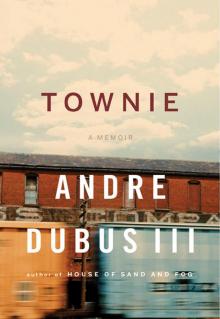 Townie
Townie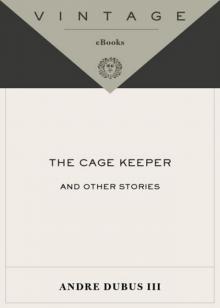 The Cage Keeper and Other Stories
The Cage Keeper and Other Stories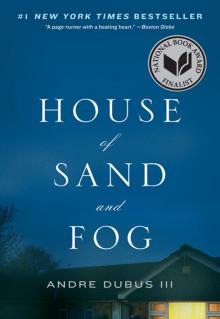 House of Sand and Fog: A Novel
House of Sand and Fog: A Novel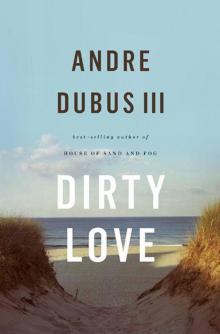 Dirty Love
Dirty Love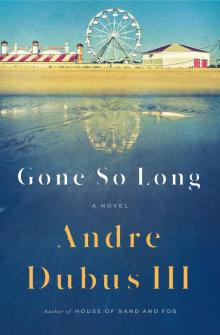 Gone So Long
Gone So Long The Garden of Last Days
The Garden of Last Days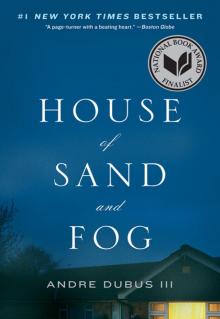 House of Sand and Fog
House of Sand and Fog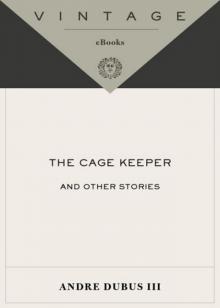 The Cage Keeper
The Cage Keeper